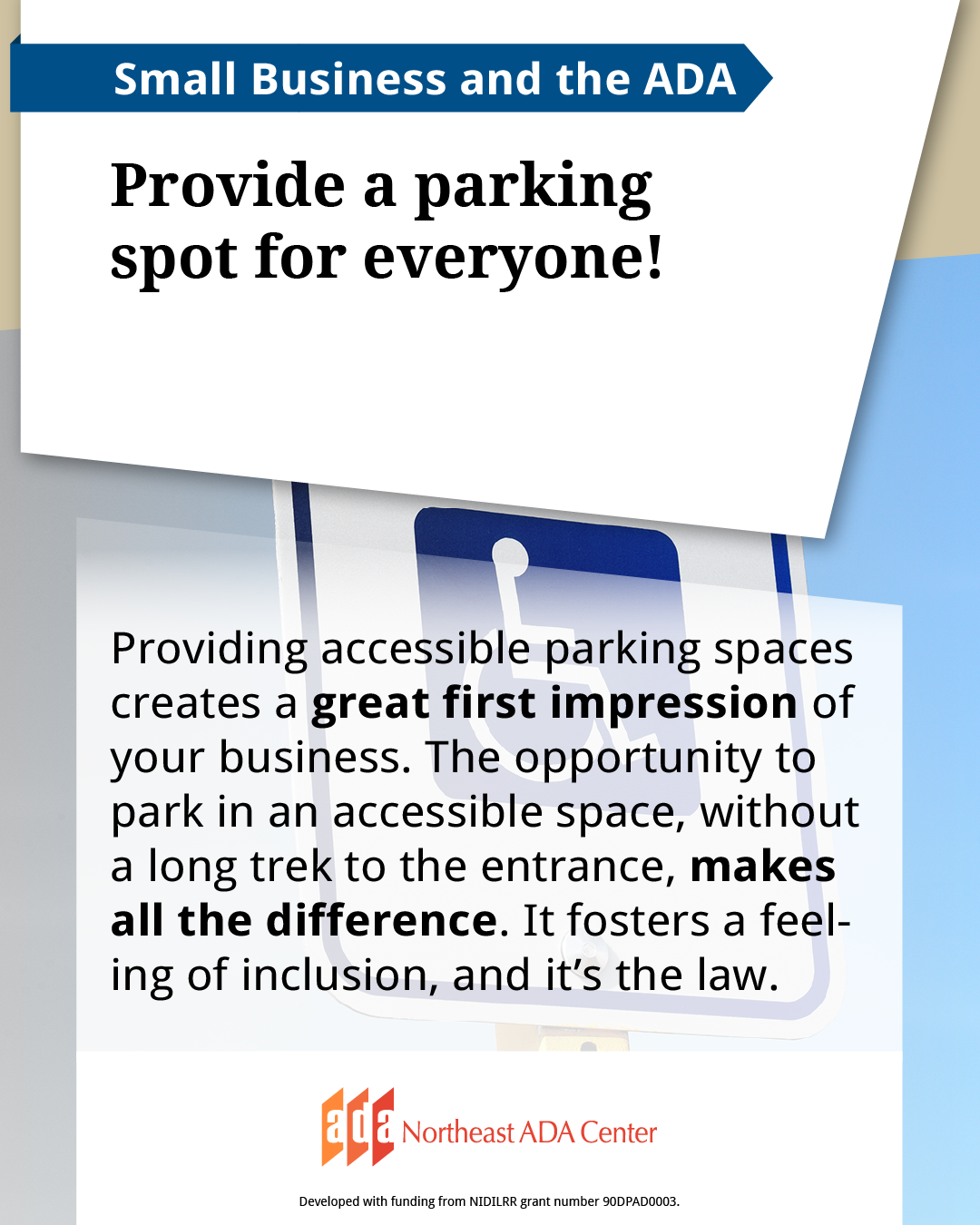Articles
-
A History of Discrimination and the ADA
Find out why civil rights laws are important for protecting people with disabilities from discrimination, and get an overview of key US civil right laws that protect people with disabilities—including... -
Who Is Protected by the ADA?
The Americans with Disabilities Act (ADA) protects the civil rights of people with disabilities, but who is disabled under the ADA? -
How to File a Complaint
If you feel that the ADA, or a related law, is not being followed, you can file a complaint. This article helps you figure out where to report the problem. -
Olmstead Decision
What’s the Olmstead decision? How does it relate to Title II of the ADA? This article introduces the Olmstead decision and looks at a few related court cases in New York, New Jersey, and Puerto Rico. -
The ADA and Parking
Accessible parking is a common feature in parking lots—and a common topic in questions posed on the Northeast ADA Center hotline.
Ask About the ADA
- Are there State laws that protect people with disabilities?
Yes. Where the ADA sets the floor for disability rights and protections, states can go further to protect individual rights. Laws such as the New York State Human Rights Law (NYSHRL) and the New Jerse... - What is the ADA?
The Americans with Disabilities Act (ADA) became law in 1990. The ADA is a civil rights law that prohibits discrimination against individuals with disabilities in all areas of public life, including j... - Can I call the ADA?
The ADA is not an agency, organization, or service provider. Also known as the Americans with Disabilities Act, the ADA is a civil rights law that prohibits discrimination against individuals with dis... - Is my ADA Complaint with the Department of Justice anonymous?
The Department of Justice (DOJ) does require a complainant to file personal information when filing a complaint. If the DOJ does look to seek action, many times in the form of mediation, it would cont... - Can the ADA Pay?
Q: Will the ADA pay for things like wheelchair vans or a service animal? A: The Americans with Disabilities Act (ADA) is a law and not a federal agency. There is no funding for providing things like...
Infographics
Blog Posts
- Historical Concerns with H.R. 620, the ADA Education and Reform Act of 2017
April 27, 2017
My friend and colleague Jim DeJong was part of an email chain in which we were discussing the ADA Education and Reform Act. He told a story of the “making of” Title III of the ADA. I asked... - Disability and Employment Discrimination Laws in the US Virgin Islands
September 30, 2019
By: Archie Jennings Archie Jennings is the lead attorney for the Northeast ADA Center’s US Virgin Island affiliate, the Disability Rights Center of the Virgin Islands. He was asked to write a... - What the ADA Tells Us about Accessibility When Implementing COVID-19 Regulations
July 08, 2020
During these times of uncertainty about what about what the “new normal” will look like as the country begins to re-open, we wanted to remind everyone about an oldie-but-a-goodie law that... - #Thanks to the ADA—Puerto Rico
July 29, 2020
As we approach the 30th Anniversary of the ADA, many people are celebrating how far we have come, as well as reflecting on how far we still have to go. The Northeast ADA Center is part of the ADA Nati... - Weather Not So Delightful: Snow Removal and the ADA
March 13, 2017
As winter hangs on here in the Northeast, snow can be a challenge for businesses and a barrier for individuals with disabilities. Snow plowed into the access aisle of an accessible parking space, or a...
Webinars
- ADA 101.2 Overview of Title I and Employment
April 26, 2021
This webinar is the third in the Northeast ADA's ADA 101 series. Intended for those new to the Americans with Disabilities Act or for those wanting a refresher, this webinar will focus on the employme...
News
- New York Passes Law Against Service Animal Fraud, Joining Other States
January 17, 2018
New York recently joined an increasing number of states that have passed laws aimed at curbing abuse of laws and regulations designed to ensure that individuals with disabilities can be accompanied by... - Football Player Sues the New York Jets for ADA Violation
November 20, 2019
The Jets' strong safety, Rontez Miles, filed a lawsuit in New Jersey state court against the NFL alleging that his rights under the New Jersey Law Against Discrimination (NJ LAD) and the Americans wit... - "Jake's Law" would nudge every N.J. county to build a playground accessible to all children
August 20, 2025
A bill up for consideration in the state Assembly would push every New Jersey County to build at least one "inclusive" playground that is accessible to children with disabilities. Inclusive playground... - Federal Government Reaches Settlement in Lawsuit over Preschool's Expulsion of a Child with a Disability
January 15, 2020
A nationwide chain of day care centers has agreed to settle federal litigation accusing it of disability discrimination. Spring Education, formerly known as Nobel Learning Communities, agreed to adopt... - As the Holidays Approach, the Latest Wave of ADA Cases Challenge the Absence of Braille Gift Cards (National Law Review)
November 20, 2019
On Thursday, October 24, we learned that a new wave of lawsuits began to flood the dockets of the New York federal courts. These lawsuits are styled as putative class actions on behalf of individuals...





